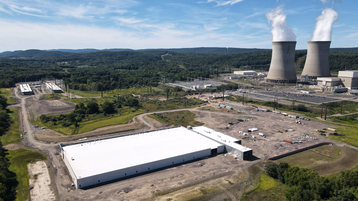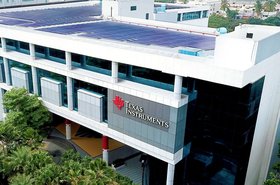Energy company Talen says attempts by rivals to block an interconnection request for Amazon’s nuclear-powered data center in Pennsylvania amount to an “ad hoc national referendum on the future of data center load” in the US.
In a filing to US energy regulator the Federal Energy Regulatory Commission (FERC), submitted on Friday, the company accused utility firms of an “unlawful attempt” to “hijack” the deal.
Amazon purchased the data center from Talen earlier this year. It is adjacent to the energy company’s Susquehanna Steam Electric Station (SSES) nuclear plant in Salem Township, and Amazon plans to develop the site into a campus of 15 data centers set on 1,600 acres.
It is intended that SESS will supply the data centers with nuclear power, seen by many operators as a clean alternative to fossil fuels. However, utility firms including American Electric Power and Exelon have called on FERC to hold a hearing into the deal.
Controversy surrounds Talen and Amazon’s nuclear data center plan
The complaint from the energy companies centers on a new interconnection request submitted for the data centers by grid operator PJM.
PJM asked FERC to approve an amended Interconnection Service Agreement (ISA) allowing Talen to sell 480MW of power to the data center without making any transmission upgrades. Under this agreement, the colocated data center would not be classed as network load and would be exempt from transmission fees.
AEP and Exelon said the proposed ISA didn’t fit the current models of service class, was poorly explained from an engineering point of view, and would result in Amazon using the grid but not paying the required fees. Describing Amazon as a “free rider,” they said costs of up to $140 million per year could be passed on to other customers as a result of the deal.
Talen: rivals attempting “unlawful” hijack of Amazon nuclear power deal
Talen had already described this intervention as a "misguided attempt to stifle this innovation,” but went further in its own submission to FERC.
Requesting that the regulator reject the protest, it said: “It is an unlawful attempt to hijack this limited ISA amendment proceeding that they have no stake in." It also claimed an intervention would turn into "an ad hoc national referendum on the future of data center load," which could prohibit other similar deals being done in future.
The energy company said PJM studies show that supplying more energy to the data centers will not impact grid reliability. “PJM explained the rationale and fully justified the interconnection amendments necessary to ensure reliability,” the filing said. “AEP/Exelon raises no ‘questions of fact’ relevant to this inquiry, and thus there is no need for further hearing proceedings beyond the filings already in the record.”
FERC has not commented on the case. DCD has contacted the regulator to find out when it might make a decision on whether a hearing will take place.
Amazon purchased the data center campus, which had been run by Talen subsidiary Cumulus Data, in March. It reportedly paid $650m for the site, which has been operational since last year.
At the time Amazon agreed to minimum contractual power commitments that ramp up in 120MW increments over several years; it has a one-time option to cap commitments at 480MW, as well as two 10-year extension options, tied to nuclear license renewals.
As part of the deal, Talen will also supply Amazon’s cloud platform, AWS, with energy from SESS via a 10-year power purchase agreement.







